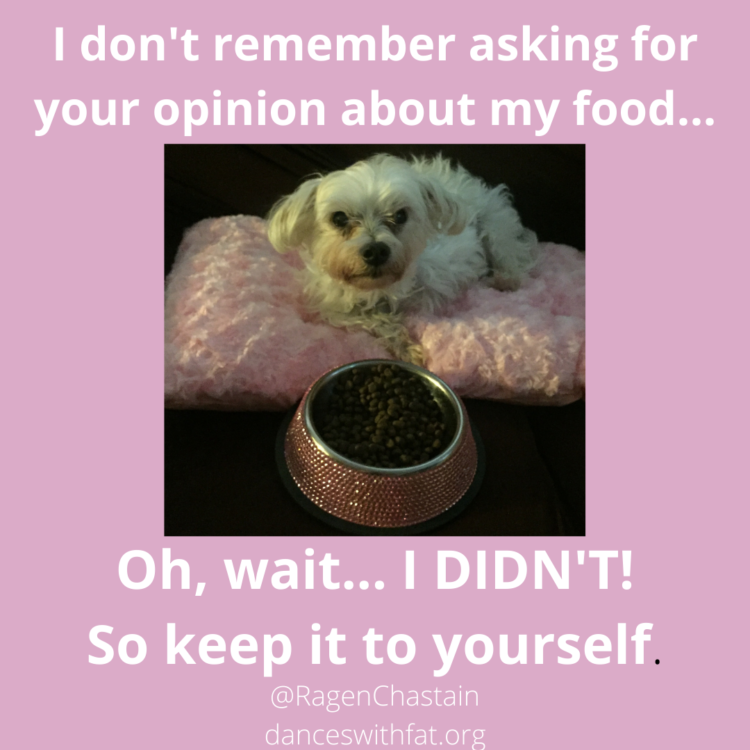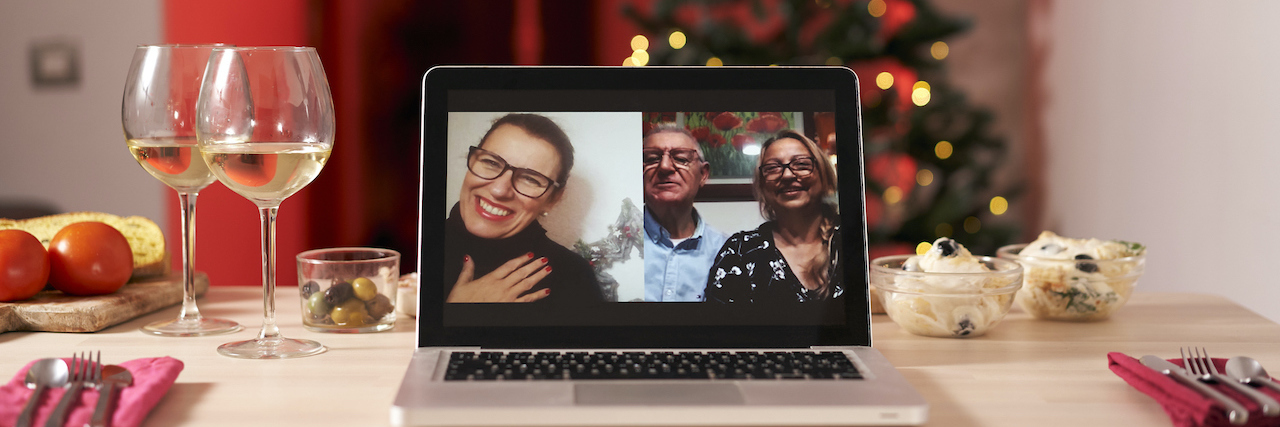Food policing happens whenever someone tries to insert themselves into the choices you are making around food. It can sound like, “Do you need to eat that?” or, “Are you sure you want seconds?” It can even be a backhanded and condescending, “Good for you for making a healthy choice!” Is there anything more fun than being under surveillance by the Friends and Family Food Police? There are a few of things that come to mind immediately — root canal, shaving my head with a cheese grater, a fish hook in the eye… This happens to almost all of my fat friends, but to be clear it happens to thin people too — food judgment and shaming happens to people of all sizes.
The way you know that a comment about your food choices is not OK is that you aren’t OK with it. That’s the entire test. People do not have a right to give you unsolicited comments/advice about your food choices. This is something that can happen anytime of the year, but it’s rampant at the holidays. (I’m already hearing about experiences people had at Thanksgiving while eating with their families over Zoom!)

Prevention Through Boundary Setting
You can choose to set clear boundaries about this either prior to the event or during it.
Step 1: State the boundary. (ie: “It’s not OK to comment on my food choices.”)
You can choose to explain a bit about why you are making the request, but you don’t have to. It doesn’t matter what other people think of the boundary or any reasons that you share, you get to set it.
Step 2: State the consequence (ie: “If you talk about my food, I’m going to leave the room/house/Zoom call.”)
The key here is that it has to be a consequence you are willing to follow through with. The good news is, it doesn’t have to be something big (though of course it can be). It can just be taking your plate to the living room, or turning off your video on Zoom.
Step 3: Follow-through (ie: “I told you that if you talked about my food I would leave the Zoom call, you talked about my food so I’m leaving the Zoom call.”)
If someone starts talking about your food choices you do what you said you were going to do, explaining it so that it’s very clear that they are experiencing the consequences of their own actions.
Conversation
You can also choose to engage in conversation in a way that keeps you feeling empowered. It can be helpful to try to ascertain where the “food policing” is coming from before formulating your response.
Judgment: The person asking the question has decided that it is their place to comment on someone else’s food choices. This is one of those situations where they would probably claim to be mistreating you for your own good. First of all, you determine what is good for you. Beyond that, if the person asking this question truly cared about you and your health (however misguided they might be), they would talk to you about it in person, alone, at an appropriate time, and they would ask a question that invited dialogue, not try to embarrass you in front of people while you’re eating what is supposed to be a holiday celebration meal. That right there is some bullshit.
Power/Superiority: Remember that some people’s bodies left junior high but their mentality was tragically left behind. For those in this situation, nothing makes them feel as powerful as judging someone else and then making them feel like crap. Maybe because they are drowning in…
Insecurity: The person asking the question is perhaps struggles with weight stigma, their guilt about eating etc. and since they feel guilty for enjoying the food, they think that you should feel guilty about it too, or they want to deflect attention from their behavior to yours.
The degree of difficulty on discerning someone’s intent in this sort of thing can range from “of course” to “who the hell knows” so just to reiterate, while it can be helpful for formulating a response, at the end of the day it doesn’t matter why they saying what they are saying, if you don’t think it’s OK then it’s not OK.
Some examples of conversation starters:
“I spent a lot of years duped by diet culture and in an unhealthy relationship with my food. I’ve been able to find my way out, but it sounds like you might still be struggling — I’m happy to send you some resources if you’d like?”
“I used to think commenting on other people’s food was appropriate too, but it turns out that perpetuating relationships with food that are based on guilt and shame is really harmful to people, and it’s a habit that we should get out of.”
“Help me understand, what made you think that I was looking for opinions about my food choices?”
“Do You Need to Eat That?”
This, or some form of it, is the most common food-shaming question that people tell me they have to deal with, so I put together some specific responses. As with so many situations where people lash out at you, remember that this is about their issues. If emotions well up, consider that you may be feeling embarrassed and/or sorry for them, and not ashamed of your own behavior and/or that it is absolutely reasonable to be emotional when you are being mistreated. Finally, I suggest you find your happy (or at least your non-homicidal) place, and try one of these as a response to, “Do you need to eat that?”
Quick and Simple (said with finality)
- Yes (and then eat it)
- No (and then eat it)
Answer With a Question (I find it really effective to ask these without malice, with a tone of pure curiosity. If you’re not in the mood to have a dialog about this, maybe skip these.)
- Why do you think that’s your business?
- What led you to believe that I want you to police my food intake?
- I thought you were an accountant, are you also a dietitian?
- Are you asking if my body at this moment requires the precise nutrients that are delivered by cornbread stuffing and gravy?
Pointed Response (be ready with a consequence if the behavior continues)
- I find that inappropriate and offensive, please don’t comment on my food choices
- What I eat is none of your business, and your commenting on it is not OK
- I have absolutely no interest in discussing my food intake with you
- I’m not soliciting opinions about my food choices.
Cathartic (but probably not that useful if you want to create an opportunity for honest dialogue. On the other hand, you are under no obligation to center the feelings of people who are doing you harm, nor is there any requirement that you open yourself up to more possible harm by creating a dialog. If you’re just over it and want that to be clear, these can be a good choice.)
- Yes, because dealing with your rudeness is depleting my glycogen stores at an alarming rate
- If I want to talk to the food police, I’ll call Pie-1-1
- I’m sure you’re not proud of the completely inappropriate behavior you just exhibited, I’m willing to forget this ever happened
- Thanks for trying to give me your insecurities, but I was really hoping to get an InstantPot this year
- No, but using my fork to eat helps to keep me from stabbing you with it
If it’s helpful I put together a video of these responses as part of my annual fat positive holiday video series! You can check that out here.
Make Like Frozen And Let It Go
There are times when speaking up is not an option — maybe there is a power differential and it’s not safe, or someone is dealing with chronic illness, or pain, or mental illness and are not in a place to address this, and sometimes we just don’t want to deal with it. That’s also a valid choice.
If this is the case then I recommend acknowledging to silently to yourself “this is bullshit and it should not be happening.”
You can create a phrase that sounds neutral but that has a… special… meaning to you like “Thanks for that,” or “Thanks for sharing,” or as those of us who have lived in the American South say, “Bless your heart.”
For closure you can role play it later and say what you would have said.
However you decide to deal with food policing, always know that it shouldn’t be happening and you shouldn’t have to be dealing with it so, while it becomes your problem, it’s never your fault.
Getty image via Carlos Barquero Perez

